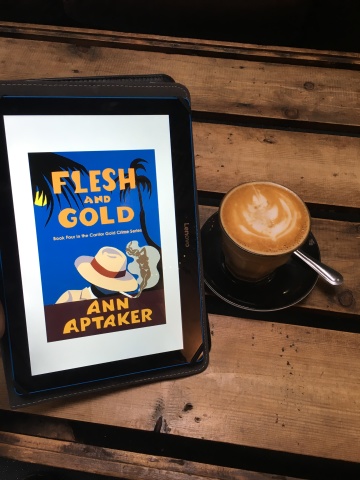Review: Flesh and Gold, Ann Aptaker
Nov. 18th, 2018 04:53 pm This was a bit of a change of pace in my reading list. I don’t normally do hardboiled crime, or thrillers, and this is something of both. I’m familiar enough with the genre to know that lesbian leads are a rarity, and butch lesbian leads more so. So I was intrigued, and the interest certainly paid off. For once, I haven’t got major pacing complaints: the book is tightly plotted, fast-paced but with enough time devoted to scene setting and minor character introductions to provide an engaging scenario.
This was a bit of a change of pace in my reading list. I don’t normally do hardboiled crime, or thrillers, and this is something of both. I’m familiar enough with the genre to know that lesbian leads are a rarity, and butch lesbian leads more so. So I was intrigued, and the interest certainly paid off. For once, I haven’t got major pacing complaints: the book is tightly plotted, fast-paced but with enough time devoted to scene setting and minor character introductions to provide an engaging scenario.The plot follows art thief Cantor Gold (established lead from earlier books in the series, which I haven’t yet read), who receives a tip that her true love Sophie (kidnapped some years ago) may have ended up in Havana. Off goes Cantor Gold, and despite her one-track mind she finds herself embroiled in a brewing gang war, and the growing tension between Americans and locals in the Cuban underworld.
Generically, the book is… odd. It’s billed as a crime novel, and I guess it is, if the inciting crime is ‘someone kidnapped Sophie, new evidence has emerged’. But the quest for Sophie is a long-running conceit of the series. Peter Grant novels, say, do not usually start with new evidence about the Faceless Man, but an apparently unrelated crime which eventually gets tangled up with the ongoing plot. In Flesh and Gold, the unrelated crime doesn’t appear until several chapters in. There’s also the fact that Cantor Gold is herself a criminal, which doesn’t /rule out/ the book being crime fiction but is certainly not genre standard. I suspect there’s a fair bit of thriller in this mix, although I haven’t read enough in that genre to be certain.
What it reminded me most of was the Gentleman Bastard books, in that it has heist elements, the complex solution-finding and mystery-solving, and a lot of violence, some of it gratuitous and voyeuristic. I can’t say that Flesh and Gold comes out the better from this comparison, though - it leans very heavily into the ‘exotic corrupt world run by blood and money, where the right connections can buy you unspeakable pleasures’, and that’s… one thing entirely when it’s set in fantasy!Amsterdam, and a much more problematic thing when it’s set in 1950s Cuba, in a book written by a white American. The narrative does make it clear in its descriptions of the tourist trade, the expansionist American gangs, and the independence movement, that what’s going on here is part of a complicated not-good historical process, but still. I’m not super happy with that.
What is more interesting is Cantor Gold’s attitudes, as a client of sex workers, to the women she encounters, to the process sex slavery (nb: i have no idea how realistic this is for 1950s Cuba. I know that does happen, and did happen, but I also know that ‘white slavery’ gets overstated by sensationalists and racists). She makes a lot of her own hypocrisy in resenting the thought of Sophie working in the sex trade, while Cantor herself pays for pleasure. I found this whole thing didn’t endear her her to me - I wanted her to find an ethical reference point, be it ‘i shall patronise only consenting sex workers’ or ‘i can be proud of Sophie’s resourcefulness if she has made herself a successful, and therefore alive, sex worker’, or… anything, really. But I have read enough hardboiled to know the grizzled detective doesn’t go in for ethical clarity like that, and in this Cantor is true to type.
As for the ending, well. A bit anticlimactic, but I came to this off the back of several too-simple HEA romances, so I’m not complaining. Very glad to have received this in ARC from Bold Strokes Books in return for an honest review.